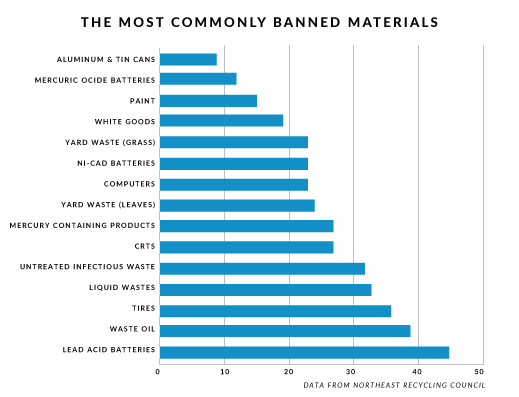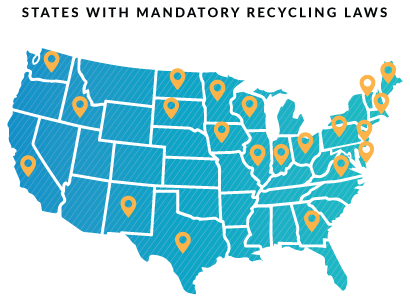The United States does not have a nationwide recycling regulation that requires businesses to recycle. Although this is the case, many state and local governments have introduced their own waste and recycling mandates that commercial businesses must follow. As a business owner / manager, it's important to understand exactly what regulations exist in your region. Read on to learn about federal, state, and local recycling regulations and what they mean for your business.
aN OVERVIEW OF RECYCLING STATUTES and regulations
Although the technicalities of recycling statutes and regulations vary, they are generally aimed at accomplishing two things: 1) to increase recycling rates and 2) decrease landfill waste. Under the Solid Waste Disposal Act of 1965, the Resource Conservation and Recycling Act gave the EPA the authority to oversee waste management and recycling and provide basic recycling guidelines for states to adopt. Fast-forward to today, and the RCRA is still the primary federal solid waste law. However, state and local governments across the country are enforcing their own waste and recycling regulations, such as mandatory recycling laws, landfill bans, e-waste laws, and more. Your business may be required to follow a number of different statutes and regulations, so read on to learn about the most common ones below:
EXAMPLES OF LOCAL / STATE mandates
LANDFILL BANS
Landfill bans make disposing of specific items in a landfill illegal. 49 states currently have landfill bans for items that cause environmental damage like batteries, untreated medical waste, computers, and more (Earth 911). Here is a list of the most commonly banned items from landfill:

MANDATORY STATE RECYCLING LAWS
Do you live in a state that mandates recycling specific materials? According to NERC, 25 states currently have mandatory recycling requirements including Pennsylvania, Ohio, Illinois, Texas, Washington, and California. Batteries, computers, newspapers, glass containers, aluminum cans, and cardboard are among the most common materials included in these mandates. If your state government doesn't mandate recycling, your local government might. For example, businesses within the city of Pittsburgh are required to recycle paper, cardboard, plastics, metal, glass, and leaf waste, and must show proof of recycling. Visit your local government's website to find out which recycling requirements are in effect in your area!

MANDATORY COMMERCIAL RECYCLING
More and more local governments are introducing regulations that require commercial businesses to recycle. In California, recycling and composting is mandatory for businesses that generate more than 4 cubic yards of solid waste per week. Likewise, Seattle adopted mandatory commercial recycling and requires businesses to separate paper, cardboard, glass, plastic bottles & jars, and aluminum cans. Since businesses already generate so much recyclable material, adopting a mandatory commercial recycling ordinance doesn't require much organizational change. In fact, the additional resources provided by the local government can help businesses recycle more and reach their sustainability goals!
MANDATORY E-WASTE LAWS
At the present time, 25 states have established a statewide electronic waste program. California was the first state to adopt an electronic waste recycling program called the Electronic Waste Recycling Act of 2003, which established a funding system for collecting and recycling certain electronic waste. 24 states followed California's lead and adopted e-waste recycling laws, including Minnesota, Oregon, Connecticut, and North Carolina. If you live in one of the 22 states without e-cycling laws, your business can and should still recycle electronic waste. Many states and retail stores will offer collection for unwanted electronic devices, including TV's, computers, batteries, and others. Check out the EPA's resource to find out where to donate or recycle your e-waste.
Federal Recycling Acts
RESOURCE CONSERVATION AND RECOVERY ACT
In addition to creating the framework for recycling guidelines, the Resource Conservation and Recovery Act (RCRA) gives the EPA the authority to work with federal and state governments to ensure hazardous waste is managed in compliance with statutes and regulations. The act ensures businesses have the guidance to dispose of hazardous waste in accordance with safety regulations. If you are an owner of a new business that generates hazardous waste, an inspector will help you determine the safest ways to dispose of the waste. Check out the EPA's RCRA overview if you're interested in learning more.
Pollution Prevention Act
The Pollution Prevention Act is a federal law that aims to prevent or reduce pollution at its source, and to recycle everything that cannot be reduced at the source. The Act requires the EPA to, "make recommendations to Congress to eliminate barriers to source reduction including the use of incentives and disincentives" and "make specific technical assistance available to businesses seeking information about source reduction opportunities." Learn more about the Act here.
How recycling STATUTES AND REGULATIONS benefit businessES
With the right information and resources, businesses can greatly benefit from recycling statutes and regulations! For starters, recycling saves money because it's much more expensive to haul waste to landfill than it is to recycle it. Also, recycling more means businesses can usually decrease the size of their waste containers or adjust their pick-up frequency, all leading to cost-savings. And while saving money is a nice bonus, recycling goes a long way in helping your business boost its sustainability portfolio. As sustainability continues to become a major focus, recycling makes sense for businesses of all types and sizes!
Keeping an eye on landfill bans, mandatory e-waste laws, and other recycling statutes and regulations in your area is always a good idea! Luckily, this doesn't have to be difficult when you work with a service provider who pays attention to local policies and your business's needs. Reach out to one of our recycling experts to learn more or get started. Thanks for reading!
